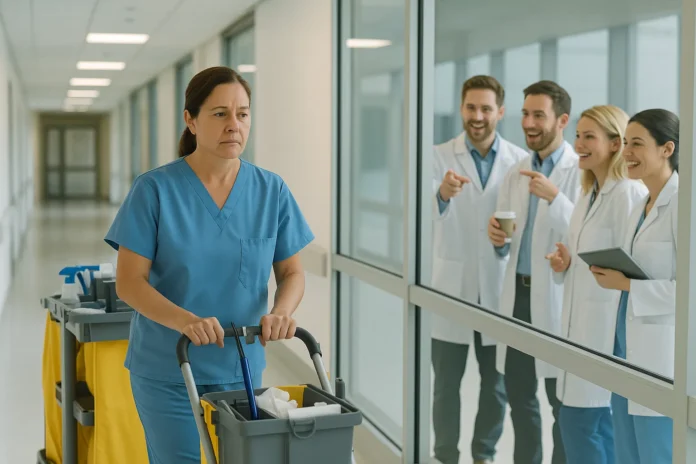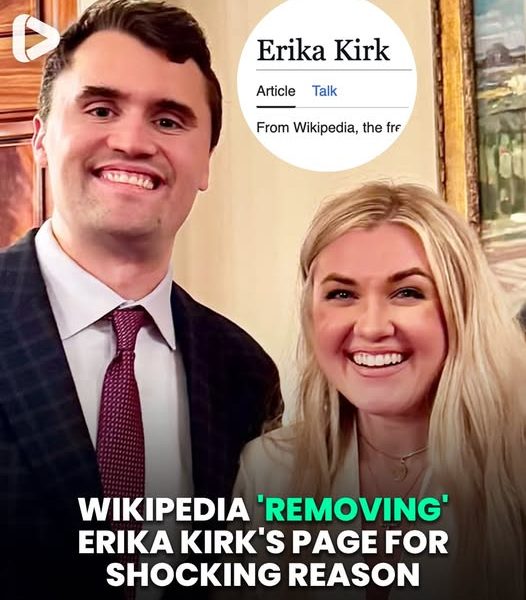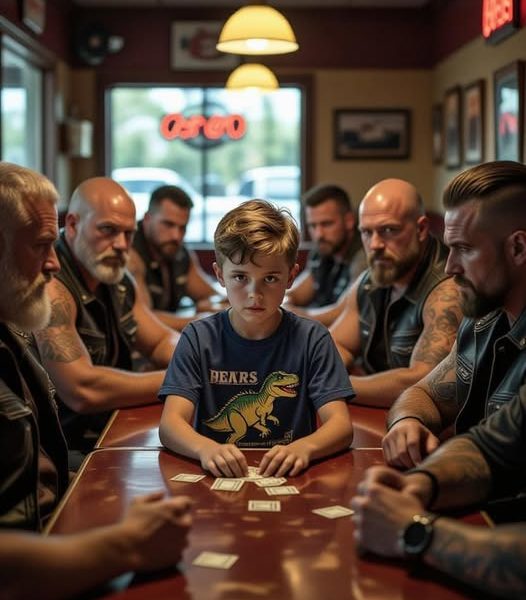At St. Joseph’s Medical Center, everything gleamed — the polished floors, the silver nameplates on every door, the endless rows of white coats passing like clockwork.
But no one noticed the woman in blue scrubs pushing a mop cart down the cardiology wing. She didn’t wear a stethoscope or carry a clipboard. Her name tag simply read Maria.
To most, she was just the janitor.
She walked the halls quietly, cleaning up coffee spills, wiping down corners, humming soft tunes to herself. No one asked her opinion. No one asked her name twice.
But on that Monday morning, the hospital’s quiet routine was about to be shattered.
And Maria — invisible Maria — would become the name on everyone’s lips.
A Billionaire in Trouble
Late Sunday night, Victor Langston, a billionaire philanthropist and major donor to the hospital, had been rushed into the emergency wing.
He had collapsed during dinner — dizzy, disoriented, and dangerously unstable. His heart rate jumped, then dropped. He blacked out twice on the way to the hospital.
By morning, every senior doctor in the building was on alert. The VIP wing was locked down. The hospital’s best minds circled the room, whispering theories. Every test came back inconclusive. Medications had no effect.
Victor was slipping — and no one knew why.
To the staff, he wasn’t just a patient. He was power. He funded research, cut ribbons, made phone calls that got departments built. If something happened to him on their watch, careers would unravel.
A Joke Turns Into Something Else
Down in the break room, a handful of exhausted junior doctors huddled near the vending machine. The mood was tense, and they needed a laugh. One of them, Dr. Nate Bell, looked out the window and spotted Maria cleaning the hallway.
“Hey,” he said, trying to lighten the mood. “What if we let the janitor have a crack at it? Can’t be worse than what we’ve come up with.”
The others laughed — too tired to care how it sounded.
“I dare you,” someone muttered.
So Nate walked to the door and waved. “Maria! Come in here a sec!”
She looked up, surprised. “Yes?”
He smirked. “Want to take a guess at what’s wrong with the most important man in the hospital?”
She paused — then nodded once. “Okay.”
“This Is Maria. She’s Been Here a Long Time.”
When Maria stepped into the VIP suite, she moved with quiet respect.
Victor lay pale and still, his breathing uneven. Machines beeped. Monitors blinked. His wife, Elaine, sat nearby, holding his hand, eyes filled with fear.
The room was full of tension.
“This is Maria,” Nate said lightly. “She’s been around longer than any of us. We figured we’d let her take a look.”
Dr. Shaw, the lead cardiologist, scowled. “Are you serious?”
Maria didn’t flinch. She stepped forward. “May I?” she asked, nodding toward the bed.
Dr. Shaw shrugged. “Be my guest.”
She didn’t glance at the monitors. She didn’t ask for charts. Instead, she walked to Victor, took his wrist in her hand, and closed her eyes.
The room went still.
She observed his fingernails — faintly bluish. She lifted the sheet, pressing gently on his feet. Then she looked up and asked calmly:
“Has anyone checked for cardiac sarcoidosis?”
The room fell silent.
A Diagnosis No One Expected
Dr. Shaw snorted. “That’s absurd. It’s far too rare. And you’re a janitor.”
Maria turned to Victor’s wife. “Has he had any inflammation in his eyes? Anything odd — redness, pain, swelling?”
Elaine blinked. “Actually… yes. A few months ago. He had an episode they thought was uveitis. It lasted weeks.”
Maria nodded. “That fits. The symptoms line up. It can mimic more common heart conditions, but with subtle systemic signs. Look at his skin tone. His legs. The rhythm of his heart isn’t just irregular — it’s misfiring.”
Dr. Bell had gone pale. He typed furiously on his tablet, reading the symptoms aloud. “Shortness of breath… conduction issues… no fever… elevated inflammation markers…”
A rush of movement followed.
Blood work was ordered. A PET scan was done.
Hours later, the results came in.
Cardiac sarcoidosis.
She had been right.
Victor was immediately started on corticosteroid therapy.
Within 24 hours, his heart stabilized. His breathing returned to normal. Color returned to his face.
Maria disappeared back into the hallway.
“Dr. Maria Alvarado”
The next day, Maria was summoned to the chief administrator’s office.
Dr. Martin Hayes, sharp suit and tired eyes, stood behind his desk.
“Maria,” he said. “Or should I say… Dr. Maria Alvarado?”
She looked down. “I haven’t used that name in years.”
“Why didn’t you say anything?”
She sat slowly. “I used to be a doctor. I lost my son during my residency. After that, I couldn’t keep going. I walked away from medicine. I needed peace.”
“You just saved a life.”
She smiled faintly. “Every life matters. Not just the ones with money.”
She Refused the Spotlight
The story exploded. News vans arrived. Reporters circled the parking lot. “Janitor Diagnoses Billionaire’s Mystery Illness!” the headlines screamed.
But Maria refused every interview. She didn’t want fame.
She stayed in the shadows — cleaning, humming, watching.
When Victor could finally sit up, he asked to see her.
Elaine wheeled him into the hospital garden — a small patch Maria had planted and tended for years. She was there, pulling weeds, as if nothing had changed.
“You saved my life,” Victor said, his voice still weak.
She smiled. “I’m glad you’re better.”
He handed her a card. “If you ever want to come back to medicine, I’ll make it happen. Or if you just want land for a bigger garden — it’s yours.”
She shook her head. “This is where I belong.”
He blinked. “Why?”
She pointed to a nearby bench, where a young nurse sat wiping her eyes after a tough shift.
“Every day, someone in this building feels invisible. I talk to them. Listen. Sometimes… that’s the medicine they need most.”
The Healing Garden
A month later, a plaque was unveiled in that very garden.
“The Maria Alvarado Healing Garden”
Victor stood beside the sign, tears in his eyes. A band played softly. Nurses clapped. Doctors nodded in silence.
Maria wasn’t there.
She was inside, pushing her mop cart down the hallway outside the pediatric wing.
She paused to help a nervous intern who dropped his notes.
“Deep breath,” she said kindly, handing them back. “You’ve got this.”
Then she kept walking, unnoticed — just the way she liked it.


